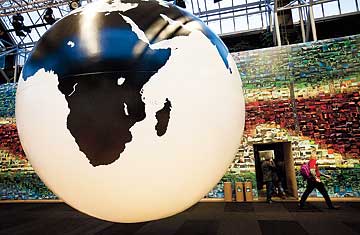
The e-mail dispute has disrupted the Copenhagen climate summit.
What you call the controversy over e-mails stolen from climate researchers at Britain's University of East Anglia depends on what you think about global warming. To skeptics, who've long suspected global warming is a fraud, the term for the incident is "Climategate," with its intimations of scandal and cover-up. Advocates of action on warming call it "Swifthack"--a reference to the loaded 2004 character attacks on Senator John Kerry by the Swift Boat Veterans for Truth--suggesting it's an invented scandal propagated by conservatives and the media that does nothing to change the scientific case for global warming. Climate-change advocates are right on the science--but skeptics may be right on the politics.
The furor began last month when unknown hackers posted on the Internet more than 1,000 e-mails sent by and to staff at East Anglia's Climatic Research Unit (CRU), a vital center for global-warming research. Spanning more than 10 years, the e-mails cover everything from internal university politics to sharp criticisms of research by climate-change doubters. It's that last point that has skeptics crying foul. In one e-mail, Phil Jones, the head of CRU, writes to a colleague about a pair of studies that criticize the case for man-made global warming, adding that he would make sure to keep the papers out of the report by the Intergovernmental Panel on Climate Change. In another e-mail, Jones writes about using a statistical "trick" in presenting climate data. Throughout the e-mails, the scientists evince scorn for the work of climate doubters, with one researcher threatening--presumably in jest--that he would "beat the crap out of" a skeptic.
Opponents of climate-change action seized on these e-mails as evidence that scientists had been playing loose with the facts and that the entire case for man-made global warming could be fraudulent. Not quite. While the e-mails showed that climate researchers could have been more responsive toward skeptics, there's nothing to indicate that widespread scientific fraud was under way. And it would have to have been widespread: the climate research from CRU is just one strand among decades of studies that point toward the conclusion that global warming is real and dangerous and that man-made carbon emissions are the major cause.
But that may not be how many Americans see the controversy. A CNN survey released on Dec. 7 found that the percentage of Americans who believe in global warming has declined 8% since June 2008, with Republicans responsible for most of the renewed skepticism. As the uproar over Climategate--or Swifthack--shows, not even science can be seen as objective in an increasingly polarized America.
